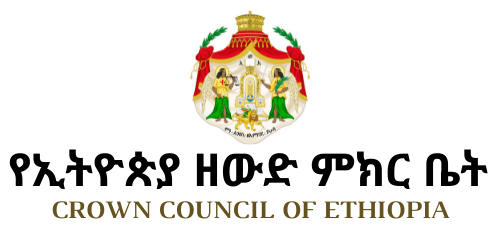A Statement on the 107th anniversary of the birth of His Majesty Emperor Haile Selassie the Great,
from Enderasse Prince Bekere Fikre-Selassie and President of the Ethiopian Crown Council Prince Ermias Sahle-Selassie
Ethiopians everywhere must always be mindful of the past, of the rich history and tradition that shapes our identity as a people. Our strengths and weaknesses as a nation, our successes and failures, provide a vision and a challenge for the future, a roadmap to understand how far we have come, and how far we still have yet to go. On the anniversary of the birth of His Majesty Haile Selassie I, July 23rd, it is fitting that we look to his life, to the accomplishments of His Majesty, to gauge our own progress, and to map our course for the years to come.
Few men in history have left such a mark on the lives of their people and the admiring eyes of the world. His memory is cherished by Ethiopians of all ages. His struggles on behalf of African freedom and unity have made him loved by Africans around the world. He stood before us as a direct descendant of King Solomon, a living symbol of continuity between an ancient civilization and a modern world, a living symbol that made Ethiopia the pride and property of all mankind.
What was His Majesty’s legacy? What are we to remember, to summon as a challenge to ourselves, on his 107th anniversary?
He was an active reformer, a strong believer in the possibilities of modernization. As regent, he worked vigorously to bring an end to slavery throughout Ethiopia. As emperor, he twice gave Ethiopia constitutions designed to pave the way for a more democratic and participatory national government. He presided over the modernization of the country’s penal code, and the opening of its first parliament. During his reign, the first beginnings of a free press took hold in our homeland.
He spared no expense in the construction and renovation of hospitals, churches, and mosques. He oversaw the creation of modern industry in Ethiopia: the first hydro-electric power plan, the first water works, the first oil refinery. He established agricultural schools and experimental farms to encourage the full utilization of Ethiopia’s natural resources.
His Majesty knew full well the precious value of a strong education, and provided a solid foundation for modern learning throughout Ethiopia. He established the first universities. He founded the first public schools. He did these things often at his own expense, from his own land, his own property.
But His Majesty did not take these steps as mere tokens, as empty gestures towards international notions of what progress required. Rather, he took these steps with the knowledge that a practical education for some Ethiopians produces practical results for all of Ethiopia. Speaking at the Haile Selassie I University graduation in 1967, he said the following: “fully aware that the vast majority of your fellow-countrymen have not had the privilege of higher education that you have had, you must accept the responsibility for identifying the fundamental problems of your country and directing the skills you have acquired towards their solution.”
In the context of world history, His Majesty’s unceasing struggle against imperialism will be one of his most lasting monuments. In 1923, he sought the security of his people through membership in the League of Nations. In 1935, he fought for his people on the front lines, as the world waited for the League to speak out against Italian aggression. When that League failed him, he stood before it without fear, and called for the judgment of God and history upon the system of European colonialism.
It is all too easily forgotten that upon regaining his throne with Allied assistance, the Emperor Haile Selassie never once became vindictive, and never sought recrimination against the harsh rule of the Fascists. True to great statesmanship, His Majesty gave full amnesty, and many Italians were able to remain in Ethiopia and continue to live without fear.
Throughout the 1940s and 1950s, he worked to complete the return of the Ogaden from British occupying forces. Through the act of federation in 1950 and the final union of Eritrea and Ethiopia in 1962, he achieved the final repudiation of the hollow accomplishments of Italian military conquest. In so doing, he bestowed upon us a powerful symbol of Ethiopian unity the lessons of which remain unfulfilled even today.
Even when earlier organizations of international solidarity failed him, His Majesty never turned his back on the world community. He played an active role in the United Nations, and an active role in support of his allies in the Korean War. In the climax of his leadership in the anti-colonial struggle, he guided the creation of the Organisation of African Unity, and steered that body away from the path of dangerous radical revolution.
Looking back on Ethiopia in the twentieth century, one man alone stands out. As we consider the future, we are mindful of his own words, when he spoke on his birthday, July 23, 1958: “As We have stated time and again, it is easy to begin, but hard to finish, and We express on this occasion both Our happiness at what We see here today, as well as Our strong hope to see this work which is now begun bearing fruit in the near future.”
On April 6, 1988, His Majesty Amha Selassie I declared Haile Selassie I to be “Haile Selassie the Great”. This simple proclamation was but one step in a journey that will shape our nation’s progress throughout the coming generations. In proclaiming him “Haile Selassie the Great”, we acknowledge our obligation to his memory, and our obligation to our own people to finish the work he started.
Remembering His Majesty on the 107th anniversary of his birth, we realize that his challenge to the Class of 1967 is a challenge to us all: we must learn our own history, we must study the works of great thinkers, but we must also seek practical knowledge, an education that heals the sick and feeds the hungry. This is a life’s journey that acknowledges His Majesty’s legacy and the magnitude of his accomplishments, a journey that is easy to begin, but hard indeed to finish. All of us must look forward to rising to that challenge.





